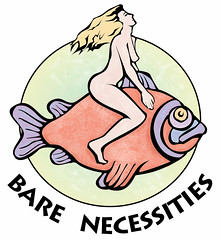 My purpose for starting this blog wasn’t to convert anyone to nudism. Primarily I started the blog for two reasons.
My purpose for starting this blog wasn’t to convert anyone to nudism. Primarily I started the blog for two reasons.
- To document my own personal experiences and immersion into the nudist lifestyle.
- To present factual information on the nudism/naturism lifestyle, to dispel myths about it and to increase awareness and hopefully more tolerance if not acceptance of the lifestyle among non-nudists who may visit this blog.
Tolerance is simply reasonable indulgence for beliefs or practices differing from or conflicting with one's own. Tolerance doesn’t mean that you need to subscribe to or adopt those beliefs or practices, but merely permit those who hold them to do so without interference. Religious tolerance is a good example of what I’m speaking of. Generally in this country we allow people to embrace whatever religion they choose or no religion at all without interference or without trying to convert them to our own beliefs. Is there any compelling reason why we can’t show the same tolerance towards nudism? If you happen to have strong moral, cultural or religious beliefs that for you cause nudism to be wrong or offensive, I respect that. I ask only the same respect in return.
Showing tolerance towards nudists doesn’t mean that you agree with them or that you give consent for people to appear nude anytime and in any place or in any manner force you to view their nudity. If nudity is offensive to you then you have the right not to suffer exposure to the nudity of others. It means only that you acknowledge that those who enjoy nudity have the right to be nude at appropriate times and in appropriate settings when there is no infringement upon the rights of non-nudists. Limiting the rights of others is a slippery slope in any democratic society. In a very real way when we limit the rights of someone else, we have in effect limited our own.
Let’s look at some practical examples of tolerance in action. Say you happen to notice your neighbor passing a window in their home completely nude. The neighbor was careless of course in not making certain to close the blinds or curtains to prevent accidental exposure to someone and causing offense, but it was an accident and not something done with the intent of exposing themselves to you. Or say you live in a two story home and happen to look out an upper floor window into your neighbor’s backyard and observe him or her nude sunbathing beside their pool. Tolerance simply means that instead of the knee jerk reaction that some would have in this situation, picking up the phone and calling the police to complain, a reasonable person would simply acknowledge that their neighbor had been careless or was unaware they were within someone’s view. If you felt strongly enough about it and felt offended, then by all means it is your right to contact the offending neighbor, tell them what had occurred and ask them to be more careful in the future. As a nudist I’d have no problem with that and would be sensitive to the concerns of a neighbor who brought something like that to my attention and would in the future exercise greater care.
On the other hand, if someone seems to be repeatedly and purposely exposing themselves in your observation or say besides exposing themselves they are also engage in some “lewd” behavior then perhaps calling the authorities would be the logical action to take. Not everyone in the nude is a nudist. You could be dealing with a garden variety exhibitionist or at the very least someone who has absolutely no respect or concern for the rights of others. Even as a nudist, I don’t want to watch others having sex or engaging in lewd behavior. No one has the right to make you feel uncomfortable. One person’s rights end where they begin to encroach upon and to infringe upon the rights of another. Tolerance has only the expectation that you will evaluate each situation separately and make your decision to act based on the specific circumstances. In any of the examples I provided you may honestly feel offended, but I ask you to consider the circumstances. Was it the result of carelessness or was the act that caused you offense purposeful? Then decide what action you feel is appropriate for that specific circumstance.







No comments:
Post a Comment